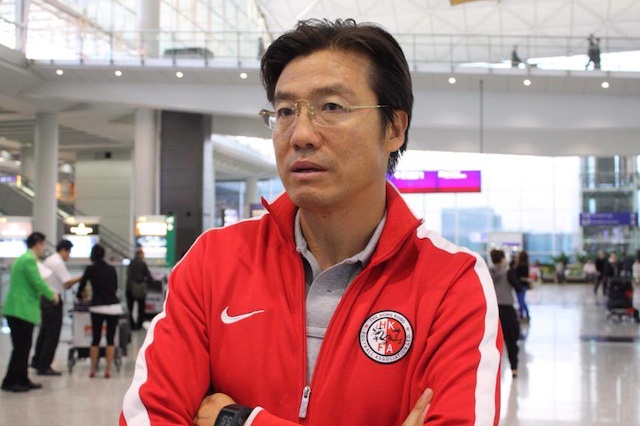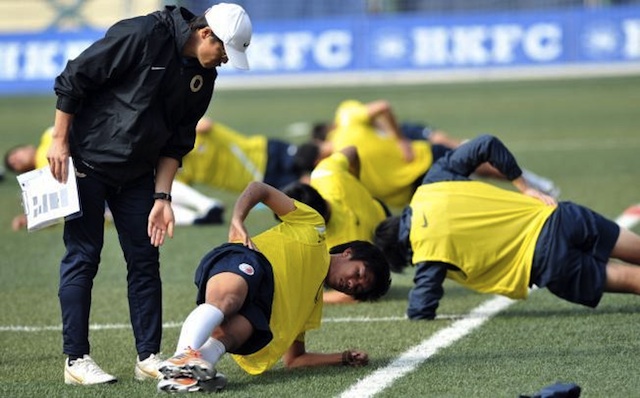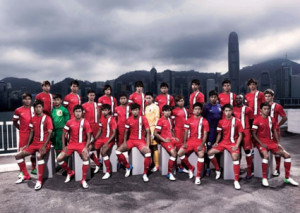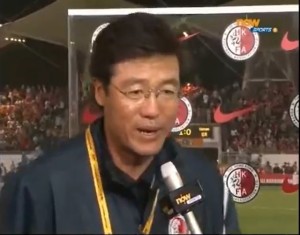Hong Kong national team manager Kim Pan-Gon is an affable and wise man who has spent the last fourteen years at the heartbeat of Hong Kong football. Sporting success in this 24/7 city is often far and few between but Hong Kongers remain eternally grateful to coach Kim for three exhilarating moments which will live long in the memory. Under his stewardship and first stint as Hong Kong team manager, his advanced training methods, tactical awareness and emphasis on fitness; saw the national team achieve some notable accomplishments. These highlights included South Korean Kim guiding the U-23 team to gold at the 2009 East Asian games football tournament (held in Hong Kong) while he motivated the senior team to reach the finals of the 2010 East Asian Football championships. His time with South China saw the club embark on their long-winding epic journey all the way to the semi finals of the 2009 AFC Cup. The second leg saw a fervent capacity Hong Kong stadium crowd back the ‘Caroliners’; sadly South China lost to Kuwait SC. It was the first full house competitive Hong Kong game in about a decade and thousands were locked outside the stadium. Coach Kim had certainly breathed new life into the local game.
Coach Kim has first hand experience of all the idiosyncrasies and nuances of the Hong Kong game so is ideal for the role. Not only is he currently the national team manager, he has also played in the Hong Kong first division (Instant-Dict, Double Flower) managed (Rangers as player-manager and South China) and was also Hong Kong national academy coach. After a short stint away in South Korea, Coach Kim has returned to make Hong Kong his home and take up the national team manager role again. He is passionate and determined to improve the level of football at all levels, to push the national team up the FIFA rankings and to qualify for a major tournament. Coach Kim has a great deal of enthusiasm for the local game as it was here where he first learnt the management trade and began to develop a far-reaching vision and blueprint for the Hong Kong game; he also has analyzed and explored deeper into how Hong Kong culture and the importance placed on education has influenced the game. Innovative in this methodology, coach Kim views fitness, physique and nutrition with equal importance to skills and tactics as he believes greater levels of fitness gives teams an edge over the opposition. He is respected by all who have worked with him and is known for his tactical mind and motivational skills.
Recent results are further evidence that Coach Kim is the right man to lead Hong Kong to greater heights. Under his current tenure, two away draws (to Malaysia and Uzbekistan) and a home win against Vietnam in the Asian cup have seen the senior national team improve significantly under his expert eye. Under the guidance and wisdom of the widely respected Coach Kim, Hong Kong have propelled up the FIFA rankings from 172 to a remarkable 137; with this being Coach Kim’s best FIFA ranking achievement thus far.
With Coach Kim at the helm, local fans can be assured that they have a steady hand and that the future of Hong Kong football is so much brighter. Coach Kim has provided so many memories and Hong Kong fans hope he can continue in the same vein. Coach Kim took time out from his busy schedule to answer some questions about Hong Kong football culture, fitness and physique and his experiences both in the K-league and Hong Kong.
You have been in Hong Kong for many years; do you have a complete understanding of the local game? Do you consider Hong Kong as your home?
Yes, since 2000, when I arrived in Hong Kong as a player and became a player / coach in 2002. For some time, I had been back to South Korea to join the K-league and I came back (to HK) again around December, 2008. I have now been in Hong Kong around 14 years so yes, Hong Kong is my kind of home. Of course, I really do know much and am knowledgeable about Hong Kong football and the league, Hong Kong youth football and Hong Kong culture. These areas, I am confident about.
In your opinion, what needs to be done to raise the overall standard of play in Hong Kong?
We should talk about the big picture and football ‘circumstances’; from the grassroots and how we can develop more people to be involved in football. It is important to have a huge grassroots following because even if someone cannot be a professional football player, they will still be a football fan when they become adults. Football ‘circumstances’ like the professional area with more people being involved; we need a big change here. We need to have a real professional league which is really competitive. To get a certain type of professional player, players will need to get a certain level of high salary; we need a stadium which is international level and only for football. All the clubs have to get their own training pitch. As a coach, from my point of view, training is the crucial part. I have seen in the last 14 years that Hong Kong does not have enough pitches for training, even for professional teams. We have to change these type of factors; all clubs have to get their own pitch and I hope teams can have their own club houses as this will improve the players footballing environment.
We should also think of elite youth development. In the last two years, the Hong Kong Football Association has tried their best to establish all age groups youth team development programs. Not only for the Hong Kong representative team but all Hong Kong clubs have to develop youth all the way up to the senior team, then we will be able to produce better players in the football leagues. If not, then we cannot produce high quality football for the professional league. The (level of) youth competition is also not strong enough. Some teams are very very strong and some teams are very very weak. There needs to be more balance and I hope we can divide up the youth league. In school competitions, Hong Kong is also very very weak as schools don’t have enough time to train together. The Hong Kong (school) system is different to the South Korean one.
We have a very strong school league in South Korea and every coach is a professional so they don’t have any other job. They (South Korean coaches) focus on preparation of training sessions and preparation for tournaments and they produce very good training sessions. (They have) a minimum five times a week training with one game on the weekend; this means a minimum of 6 sessions for the youth. Here, in Hong Kong, we have two sessions a week and one game while some clubs have one session and one competitive game. We have to change if we want to become a better football country, we need to have more training sessions for the youth. We also need to encourage parents to change their mindset. In Hong Kong, most parents like to focus on the academic side. It’s all related and if we have a good professional league and salaries then they (young players) will have a good future then parents will change their mind in terms of supporting football as a career in Hong Kong. These kinds of things we have to change and also we have to develop coach education because without good coaches, how do we develop a good youth players? I believe that, South Korea, in the last 20 years, have placed a great deal of effort in terms of changing the coaching side. After this change, youth development in South Korea also changed as well.
Are there other national coaching systems which Hong Kong could try to implement?
In terms of playing style, we have tried to make a new national curriculum. I suggested that we should try and study the history of HK football, the culture of Hong Kong and our physical body standards and where we are in terms of this. We need to study these types of things first. I believe Hong Kong (Body standard’s and physique) is similar to Japan and Korea and China but we are a bit different in terms of culture. For example, Hong Kong is a ‘peaceful’ city and parents really care for their children so the mentality does not seem competitive enough.
In terms of physique, we can then calculate which country we are similar to in the world. We can try and follow Spanish and Mexican football as they are quite fast and have a strong mentality. Hong Kong still does not have this type of mentality. This has to be developed. I am really impressed by Mexican football. They are small but very very fast and Spanish players are also small and very fast; well not that small but they are not like Germany and England who use their larger frames.
What has been your greatest achievement as national team manager?
I can think of several moments since 2009. I began (as Hong Kong manager) in August 2009 and Hong Kong joined the East Asian cup qualifying and we got to join in the final rounds. That time, we drew with North Korea, beat Chinese Taipei 4-0 and Guam 12-0. On goal difference, we qualified to make the top four. This was a good achievement. Also in 2009, was the East Asian Games gold medal game. It may never come back again but a really memorable moment. I am also very proud of South China’s AFC cup run. On the way (to the semi-final), we beat an Uzbekistan club and it was a great overall performance.
The South Korean national team have developed into a respectable global name. What steps did the South Korean FA take to reach these new heights? Have you used any of their methods here?
South Korea have a great system in terms of youth development systems, competition systems and coach education systems. South Korea has a huge number of playgrounds and all schools have their own playground. The school team can train when they want and all clubs have their own training fields. We have a good standard of fields and stadiums. I tried to place the South Korean mentality in Hong Kong. They (South Korean footballers) are always serious, do their best and they always respect their coach and teammates. If you request 100% then they give you 120%. They have a loyalty to their club and country. They care about their honor. They self motivate themselves and they play for honor and family instead of money. I want to teach this spirit and mentality to our players in HK. They try but sometimes some easily give up if they face strong opposition and a difficult situation.
Are some players intimidated or too respectful?
I think before some big games, in their heart, if we face a strong team, they think the other team is difficult to beat. At this moment, the HK team is not at a strong level so I can understand this thinking but even in practice,the last few days, the weather was not good so many players were missing. As a player, we need to teach greater responsibility and mentality. For the youth footballers we should develop the technical side and place more emphasis on the technical part. We should also work on physical strength as the most important thing is fitness. If we have a low fitness level then we cannot beat teams. We have to be close or nearly on the same level as the opposition. Once we are on the same level then we can talk about tactics and systems. This is why I emphasize we should develop fitness levels and from strong fitness, we can develop a stronger mentality.
Do you also monitor their diets?
They have enough information from their own clubs on diet. Here, in Hong Kong, with both parents working, it is hard to monitor to what youths eat and how to emphasize what to eat but in Korea, we really care about nutrition, from morning breakfast to lunch to dinner. For example, if they make it as a professional then aside from the 3 meals, vitamins are also included. These things have made a difference in Japan, Korea and China. For example, we once had a Japanese coach come to join our club for a few months. Immediately, he noticed the difference in the eating and meal habits so nutrition is a very important part.
What are the differences and similarities you see in the set up and structure of the Hong Kong league and the K-league?
One side is the financial side. South Korea’s foundation for (football) finance is very different to Hong Kong. In terms of the club budget and salary, there is a huge difference. For the coach and staff’s salary, there is also a huge difference and (in terms of the football) environment; all systems of the game have a huge gap. So there is a big gap between the Hong Kong league and the K-league.
Can Hong Kong catch up?
As a rich country, we can develop. The South Korean government always supports football. The commercial side (South Korean companies) also really support the game so large companies are always willing to sponsor the K-league teams. These companies may not get much back (in terms of finances) but as they earn money from the people, they also want to give it back to the people. I hope Hong Kong’s commercial side will do the same; if they earn money from Hong Kongers then hopefully they will give it back to the people so that people may enjoy quality football from the investments made in the football side of life.
What do you look for in a player when selecting the national team?
I place an emphasis on and try to see if he has very good football sense and also once we make the selection, we see if they are mentality tough. If they are two players with same skills and playing level then I see what their body physique is like. I also count and check if they regularly play in the first eleven in their club.
How many games do you watch?
I try my best to see all the games in the schedule at the stadiums. I follow the Saturday and Sunday league schedules.
Christopher KL Lau is the Hong Kong Correspondent for Wildeast Football. He has figured out twitter and can be found here: https://twitter.com/Chris_KL_Lau



